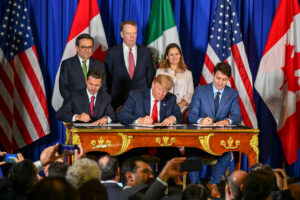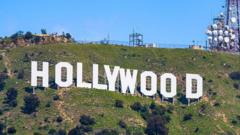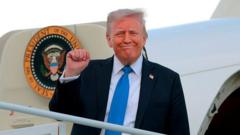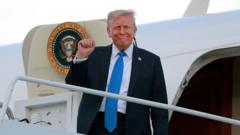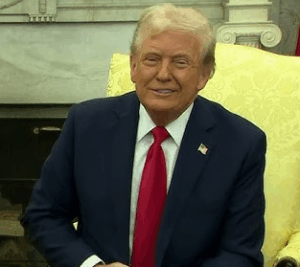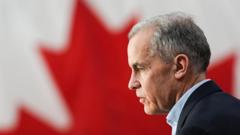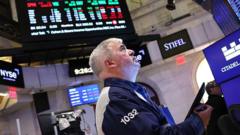The implications of US tariffs are reshaping the toy industry as Mattel prepares for price hikes and reduced imports from China.
Mattel Signals Price Increases Amid Tariff Pressures

Mattel Signals Price Increases Amid Tariff Pressures
Rising tariffs and supply chain shifts prompt Barbie manufacturer to adjust pricing strategy.
Mattel, the renowned maker of Barbie dolls, announced it will implement price increases on certain toys sold in the U.S. as a response to rising costs driven by President Donald Trump's tariffs. The toy giant is also planning to scale back the volume of products manufactured in China intended for the American market. This news comes alongside car manufacturer Ford’s estimate that tariffs will add approximately $1.5 billion (about £1.13 billion) to its costs for this fiscal year.
Mattel’s caution reflects a broader trend among large corporations grappling with the implications of U.S. trade policies. The company warned investors that due to the unpredictable economic climate and the ever-shifting landscape of U.S. tariffs, forecasting consumer spending for the remainder of the year and the holiday season is challenging. Presently, the U.S. market contributes nearly 50% of Mattel's overall toy sales, with around 20% of its merchandise imported from China. The company intends to reduce this reliance on Chinese goods to below 15% by the following year.
Since returning to office in January, Trump has imposed substantial import duties on Chinese goods, with rates soaring as high as 145%. Recent reports indicated that, when combined with existing tariffs, taxes on select items from China could escalate to 245%. As a counteraction, China has levied a 125% tax on U.S. products. Beyond China, Mattel also sources products from Indonesia, Malaysia, and Thailand—all of which experienced significant tariffs in April before a temporary halt for 90 days.
In a recent statement, Trump acknowledged the potential repercussions for American families, stating that children might "have two dolls instead of 30" due to increased prices, although he claimed that China would bear a greater burden from these tariffs.
In addition to Mattel, Ford projected a total tariff-induced cost increase of $2.5 billion this year, primarily due to escalated expenses from Mexican and Chinese parts. The automaker has sought to mitigate some of these costs, including transferring vehicle production from Mexico to Canada to evade U.S. tariffs. Reflecting the uncertainty surrounding Trump's trade policies, Ford has suspended its annual earnings forecasts.
Other companies, including tech giant Intel and footwear brands Adidas and Skechers, have also articulated the pressures resulting from tariffs on their operations. Intel’s CFO noted that the fluctuating trade policies and related regulatory risks heighten the chances of an economic downturn. Adidas forewarned consumers of impending price increases for popular sneakers, while Skechers described the current economic landscape as overly unpredictable for reliable planning.
Procter & Gamble, which produces well-known products such as Ariel detergent and Gillette razors, is also contemplating price adjustments to offset the heightened costs of materials sourced from both China and other regions, underscoring the widespread economic impact of current trade policies.
Mattel’s caution reflects a broader trend among large corporations grappling with the implications of U.S. trade policies. The company warned investors that due to the unpredictable economic climate and the ever-shifting landscape of U.S. tariffs, forecasting consumer spending for the remainder of the year and the holiday season is challenging. Presently, the U.S. market contributes nearly 50% of Mattel's overall toy sales, with around 20% of its merchandise imported from China. The company intends to reduce this reliance on Chinese goods to below 15% by the following year.
Since returning to office in January, Trump has imposed substantial import duties on Chinese goods, with rates soaring as high as 145%. Recent reports indicated that, when combined with existing tariffs, taxes on select items from China could escalate to 245%. As a counteraction, China has levied a 125% tax on U.S. products. Beyond China, Mattel also sources products from Indonesia, Malaysia, and Thailand—all of which experienced significant tariffs in April before a temporary halt for 90 days.
In a recent statement, Trump acknowledged the potential repercussions for American families, stating that children might "have two dolls instead of 30" due to increased prices, although he claimed that China would bear a greater burden from these tariffs.
In addition to Mattel, Ford projected a total tariff-induced cost increase of $2.5 billion this year, primarily due to escalated expenses from Mexican and Chinese parts. The automaker has sought to mitigate some of these costs, including transferring vehicle production from Mexico to Canada to evade U.S. tariffs. Reflecting the uncertainty surrounding Trump's trade policies, Ford has suspended its annual earnings forecasts.
Other companies, including tech giant Intel and footwear brands Adidas and Skechers, have also articulated the pressures resulting from tariffs on their operations. Intel’s CFO noted that the fluctuating trade policies and related regulatory risks heighten the chances of an economic downturn. Adidas forewarned consumers of impending price increases for popular sneakers, while Skechers described the current economic landscape as overly unpredictable for reliable planning.
Procter & Gamble, which produces well-known products such as Ariel detergent and Gillette razors, is also contemplating price adjustments to offset the heightened costs of materials sourced from both China and other regions, underscoring the widespread economic impact of current trade policies.




